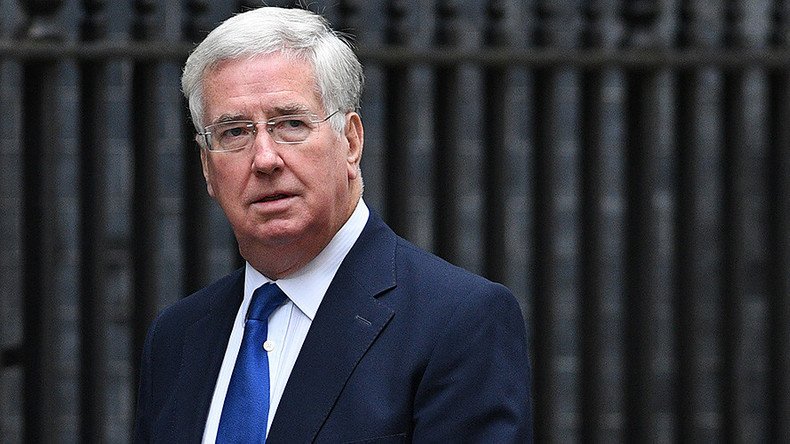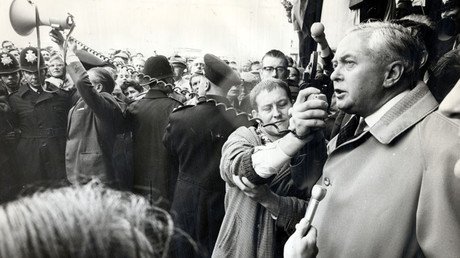Michael Fallon & the theater of the absurd

How times have changed! Fifty years ago this week, Soviet Prime Minister Aleksey Kosygin got the red-carpet treatment on an eight-day visit to Britain.
Prime Minister Harold Wilson, a supporter of East-West detente, spoke enthusiastically about greater Anglo-Soviet co-operation.
In February 2017, by contrast, Britain’s ultra-hawkish Defense Secretary Michael Fallon goes to his alma-mater, St Andrews University, to bash Russia and warn us of ‘Russia’s military resurgence.’
Fallon’s speech, entitled “Coping with Russia,” essentially consists of one contrived statement after another. The Defense Secretary, in order to paint a picture of Russia’s “aggressive” behavior on a number of fronts, passes off as facts things which are either false or unproven, and omits important background information essential to understanding what’s been going on in recent years.
Let’s take a closer look at his claims of Russia’s errant behavior.
1. Ukraine
Fallon states that: “In February 2014, President Yanukovych fled Ukraine in the wake of the Euromaidan protests.” Well that‘s true enough. But crucially, he fails to mention that Yanukovych was no dictator, but a democratically-elected president and that the protests against him were financed and supported by the West. He also fails to mention (surprise, surprise) the phone call between the US State Department's Victoria Nuland and US Ambassador to Ukraine Geoffrey Pyatt, in which they discussed who should/shouldn’t be in the new Ukrainian government.
Fallon asserts: “Russia did not allow Ukraine to decide its own destiny like any other sovereign country.” In fact, it was the West that did that. The Yanukovych administration was targeted for ‘regime change’ because it wanted to maintain Ukraine’s position as a bridge between East and West, whereas the US and EU wanted Ukraine firmly in its orbit. Fallon then states “under the guise of ambiguous and deniable instruments it (Russia) annexed Crimea,” conjuring up images of Russian tanks rolling into Sevastopol.
But Russia already had a military base in Crimea. Its Black Sea Fleet had been stationed there for over 200 years. All that happened is that after the events in Kiev and the toppling of a government they had broadly supported, the predominantly Russian population of Crimea, fearful of their future in a Ukraine in which hardcore nationalists were once again prominent, voted in a referendum to return to Russia. Fallon conveniently neglects to inform his audience that Crimea was part of Russia from 1783 until 1954. I wonder why he did that?
2. The fighting in Donbass
“In the Donbas, (the UK government’s website uses the Ukrainian spelling and not the Russian ‘Donbass’), almost 10,000 people have been killed and nearly 1.5 million displaced. Despite the Minsk Agreements and successive ceasefires, the conflict not only continues, but also intensifies. Ordinary people suffer as the ceasefire is violated every day while Russian land mines and artillery take their toll,” Fallon says.
He makes it sound as if all the deaths in the region are the fault of Russia, with no mention at all of the role played by the Ukrainian government. As an Amnesty International Report has acknowledged: “both sides committed war crimes.” There are also reports of a new ‘creeping offensive’ by Ukrainian forces.
But let’s not talk about that, eh, Michael, as it doesn’t fit your one-sided Russophobic narrative, does it?
3. Syria
The Defense Secretary describes this as Russia’s “second theatre,” after Ukraine. He says: “Its intervention in September 2015 was not to target Daesh terrorists but to shore up the ailing Assad regime demonstrated by 80 per cent of its air strikes being conducted against non-Daesh targets. Since then Russia has targeted the Syrian opposition in Aleppo with little regard for innocent lives.”
Sorry, Mike, but this is utter hogwash.
Russia’s intervention in Syria played a major part in rolling back the advances of Daesh (Islamic State) and other radical extremists and that's what it was meant to do.
Even US Secretary of State John Kerry admitted this in a leaked discussion with anti-Assad figures in Geneva. “The reason Russia came in is because ISIS was getting stronger. ISIS was threatening the possibility of going to Damascus and so forth and that’s why Russia came in. Because they didn’t want an ISIS government.”
The US and its allies by contrast (Britain included) seemed happy to let Islamic State (IS, formerly ISIS/ISIL) expand towards Damascus to put extra pressure on the Syrian government, which they wanted toppled.
Wow. In leaked audio Kerry admits the US watched ISIS grow stronger in #Syria so they could use it against Assad, but then Russia stepped in pic.twitter.com/OyeQTB8dKe
— Sarah Abdallah (@sahouraxo) January 6, 2017
As for targeting “the Syrian opposition in Aleppo,” Fallon conveniently forgets to mention that the ‘opposition’ there was principally comprised not of nice, mild-mannered ‘democrats’ in suits clutching copies of ‘Parliamentary Procedure,’ but of hardcore Al-Qaeda and Al-Nusra Front fighters. Russia was targeting the same people that the West was supposed to have been fighting a ‘war on terror’ against, but when Russia gets involved, all of a sudden it’s a great crime.
4. Cyber-hacks
Fallon accuses Russia of carrying out cyber-attacks in several Western countries (including the US) “to disable democratic machinery.” But again, where’s the proof of this skulduggery?
He cites as his evidence of Russia targeting a referendum in the Netherlands the comments of a “journalist from the Washington Post” who noted: “Many of the no campaign’s themes, headlines and even photographs were lifted directly from Russia Today and Sputnik.”
And who is this unnamed Washington Post journalist, quoted by the UK’s Defense Secretary? Why, it is none other than the virulently anti-Russia Anne Applebaum, a ‘senior adjunct fellow’ of the defense-industry funded CEPA.
What a small world!
As for the Washington Post being a reliable, impartial source on Russia, remember that only a few weeks ago, the same paper had to backtrack on a claim that Russia had hacked into the US power grid at a Vermont utility.
Fallon didn’t mention that. Instead, like the good neocon he is, he railed against RT and Sputnik.
5. Troop build-ups
Fallon goes into full Orwellian mode here.
“Whereas their (Russian) deployments seem designed to intimidate, ours are designed to reassure allies – especially those most threatened by Russian behavior,” he declares.
But you only have to look at a map to see who is threatening whom.
“In Latvia, Lithuania and Estonia, next door to Russia, the US military is deploying combat troops, tanks, heavy weapons. This extreme provocation of the world's second nuclear power is met with silence in the West,” says award-winning journalist and reporter John Pilger.
Pilger notes that the last time there was such a big military buildup on Russia’s borders was in World War II. Twenty-seven million Soviet citizens lost their lives when the Nazis invaded in 1941. But for Fallon and other Western hawks, that doesn’t matter. Russia’s defensive deployments within its own borders “seem designed to intimidate.”
6. Litvinenko
Obviously, if you‘re trying to propagandize against Moscow, you have to bring this 2006 case up, and Fallon doesn’t disappoint. “Russia labeled the independent inquiry into the murder of Alexander Litvinenko in London, which found Russia responsible, a “theatre of the absurd,” he says.
But you don’t have to be Russian to have found the ‘independent inquiry’ absurd. American media analyst William Dunkerley, who has written two books about the case, gave six reasons why the report could not be taken seriously. “The report relies on hearsay and is marred by inconsistent logic. It offers no factual insights into what really happened to Litvinenko, yet has been taken as gospel truth by governments and pundits across the West,” Dunkerley writes.
Even allowing for its flaws, it is also inaccurate of Fallon to say that the report “found Russia responsible.” Its conclusion was that the murder was ‘probably’ approved by the Kremlin.
21st January 2016- an important day for the English language. When the word ‘probably’ was redefined as ‘certainly’ #Litvinenko
— Neil Clark (@NeilClark66) January 22, 2016
‘Probably’ is not the same as ‘certainly,’ as those who backed red-hot favorites Liverpool to beat Wolverhampton Wanderers in the FA Cup last weekend will understand. (Wolves won 2-1).
7. The Art of Lying
“Another feature of Russian activity is the elevation of what Churchill called the 'terminological inexactitude,' to an art form,” says Fallon.
“There is a special Russian word for this... Not “maskirovka”... the old deception perpetrated by its intelligence agencies... but “vranyo” where the listener knows the speaker is lying, and the speaker knows the listener knows he is lying, but keeps lying anyway.”
That to me sounds exactly what Western neocons did in the run-up to the Iraq war. In fact, lying has been the hallmark of Western foreign policy for many years now. But let’s pretend 'terminological inexactitude' is just a Russian thing, shall we? And hope people forget about those non-existent Iraqi WMDs.
8. “Destabilizing countries, undermining the international rules-based system...” (er, who does that remind you of?)
You can find no better example of what psychologists call ‘projection’ as Fallon’s accusation that Russia “is seeking to expand its sphere of influence, destabilize countries... and is undermining the international rules-based system”
Because it has been the NATO powers themselves, which, since the end of Cold War 1.0, have been extending their sphere of influence across the globe and destabilizing sovereign states a plenty. NATO illegally bombed independent Yugoslavia in 1999 in order to bring the country into its orbit, and it bombed and destroyed independent Libya, the country with the highest living standards in Africa, in 2011. As for undermining the ‘international rules-based system’ – well there’s no better example of that in the past 20 years than the blatantly illegal assault on Iraq in 2003. And guess what – Michael Fallon, the man so concerned with the ‘international rules-based system’ today, strongly supported that criminal venture.
Theater of the Absurd? The UK Defense Secretary has just put in an excellent audition for a lead role.
Follow Neil Clark @NeilClark66
The statements, views and opinions expressed in this column are solely those of the author and do not necessarily represent those of RT.















